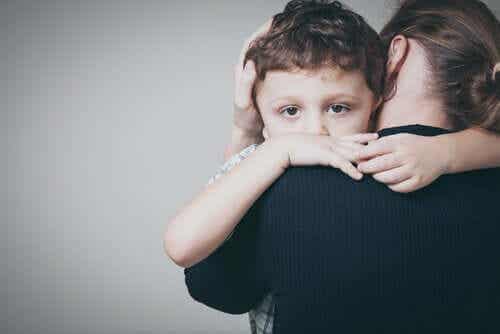More than having perfect children, we should be concerned about having happy children. One of the effects of hyper-parenting is that it puts pressure on children and makes them stressed and vulnerable, which prevents them from feeling comfortable with themselves.

Last update: October 22, 2022
The effects of hyper-parenting are mainly reflected in the child's self-concept and in the ability to establish healthy relationships with others.
These effects persist into adulthood and are not easy to identify or overcome once installed. Hence the importance of becoming aware of this phenomenon.
Hyper-parenting is a term used for some years to define a parenting style in which parents exercise particular overprotection and excessive control over their children.
This style of education has become quite a widespread trend, especially among the middle and upper strata of society.
“I believe what we become depends on what our fathers teach us at strange times, when in reality they are not trying to teach us. We are made up of these little fragments of wisdom ”.
-Umberto Eco-
The most problematic aspect of this situation is that parents do not perceive this parenting style as a dysfunctional model, quite the opposite.
They are imbued with the mentality of success to the bitter end e the children end up being another project framed in the logic of "the best in everything". The effects of hyper-parenting are silent at first and most noticeable in the long run.
What is hyper-parenting?
Hyper-parenting is a parenting model in which we want to address the shortcomings and solve the problems of the children.
They also want their children to perform excellently in everything they set out to do. Plus, they make them feel like they deserve everything, simply because they exist. Parents want to have hyper children.
It is an artificial parenting style, in which one thinks that the child does not have to face difficult times, make mistakes or make decisions. This is exactly what parents are for: preventing discomfort from reaching their children, preventing them from making mistakes and directing their lives towards the heights of success.
In the short term, the effects of hyper-parenting may also be positive in specific contexts. But in the long run and from a global perspective, such effects are very damaging.
This phenomenon is due to several factors. Now the families are fewer and the extended ones are no longer surprising. Similarly, current parents have older children than before. This leads them to want to be the perfect parents, ideal children.
On the other hand, there is a whole bombardment of information and offers, according to which parenting is a very complicated subject, which requires a manual for everything.
Finally, many parents have found in hyper parenting a model that allows them to project their own gaps and insecurities.
The effects of hyper-parenting
The effects of hyper-parenting are manifold. First of all, the high dose of stress it generates in children. In their longing to make their children flawless, parents significantly reduce the space for exploration, mistakes, free time, boredom and frustration.
They cannot be children, and this especially affects the little ones. They know, implicitly, that a lot is expected of them.
As a consequence of the above, another of the great effects of hyper-parenting is the stagnation of the development of autonomy. The child grows up feeling that he needs to be directed and oriented for everything.
He does not trust his own resources, since it could not even explore them, but it requires the approval of an authority. He does not know, because his criteria have not been formed. He needs someone who "knows", who tells him if what he thinks, feels or does is valid.
All of this ends up creating strong insecurities and feelings of low self-esteem and incompetence. On top of that, a gigantic vulnerability. It is difficult for hyper-children to tolerate criticism and they feel soul hurt if someone questions them.
It is also very likely that they are afraid of everything: they need a hand to support them, because they do not have enough strength of spirit to dare to venture.
Hyper-parenting is typical of anxious and insecure parents. Author of the book Felici e imperfetti. How to stop being hyper parents, Eva Millet recommends more relaxed parenting.
Allow children to express themselves freely and participate in decisions that affect them. Understanding that frustration is also part of education and that it makes us stronger and more resilient.
Character formation takes place, in fact, by not always getting everything we want and by making mistakes. Basically, this is life.


























